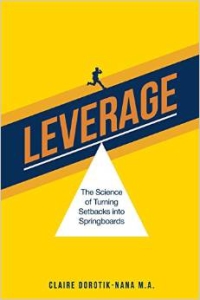Title: Leverage: The Science of Turning Setbacks into Springboards
Author: Claire Dorotik-Nana
Publisher: Createspace
ISBN: 978-1508634294
Pages: 160
Genre: Self-Improvement/Non-Fiction
Reviewed By: Krista Schnee, Pacific Book Review
Book Review
In this complex, modern world, no one can entirely avoid misfortune. Indeed, by the time we reach adulthood, experiencing a crisis—even a major, life-threatening one—isn’t uncommon, and yet, for most, it is certainly unwelcome. Rather than focusing on what can be learned from a difficult situation, we often rush through it, wishing to put that time behind us and move on to more pleasant things. Popular life coaches and societal norms also encourage this tendency, In a world that seeks to avoid difficulties, it is often easier to just follow along.Perhaps by seeking to hide from these inevitable problems, though, we are actually missing an opportunity for growth. This all to common fear might limit our experience and enjoyment of life as well as prevent us from utilizing an important asset, the ability to adapt to current circumstances. In fact, the modern emphasis on victory over various issues may be misguided as it is the struggle—the messy and often anxiety-filled changes brought about by adversity—that may be the most meaningful. This struggle to pass through difficulties creates personal strengths not obtained through any other means.
It is this view that guides Claire Dorotik-Nana’s new book, Leverage: The Science of Turning Setbacks into Springboards. In this work, she guides the reader through the science and philosophy of setbacks and how the lessons they bring can be maximized. The latest psychological studies of matters such as cognitive biases and PTSD provide the basis for the book, which is further deepened by the addition of philosophical concepts, especially that of dialectical thinking. After providing the reader with a thorough understanding of setbacks and the possibilities for growth inherent in these experiences, Dorotik-Nana gives the reader concrete exercises to help develop their own ability to adapt and make the most of their own difficulties.
In Leverage, Dorotik-Nana provides a concise, alternate view of adversity, one in which our various problems lay before us a path toward growth. Unlike self-help books that offer an overly Pollyannaish picture of life and the issues that might be faced, Dorotik-Nana instead acknowledges the entirety of the struggle, giving the reader a clear idea of how even the most difficult aspects of a trauma can occur concurrently with positive signs of growth. Indeed, our attempts to dampen or even avoid these very aspects may hinder forward progression.
Through various methods—including scientific studies, philosophical arguments, personal stories, and user exercises—Dorotik-Nana gives the reader a complete understanding of setbacks and how to utilize them for growth. In this way, the book is unique in scope and content and would certainly be a beneficial read for anyone seeking a more mature outlook on their own problems. Additionally, with the many types of content and delivery methods, the book would be appropriate for a wide range of readers but will be more accessible to those with some advanced education. However, Claire Dorotik-Nana’s Leverage: The Science of Turning Setbacks into Springboards will be sure to provide thought-provoking content for any attentive and open reader who would like to learn a better way to walk through difficult times.



Follow Us